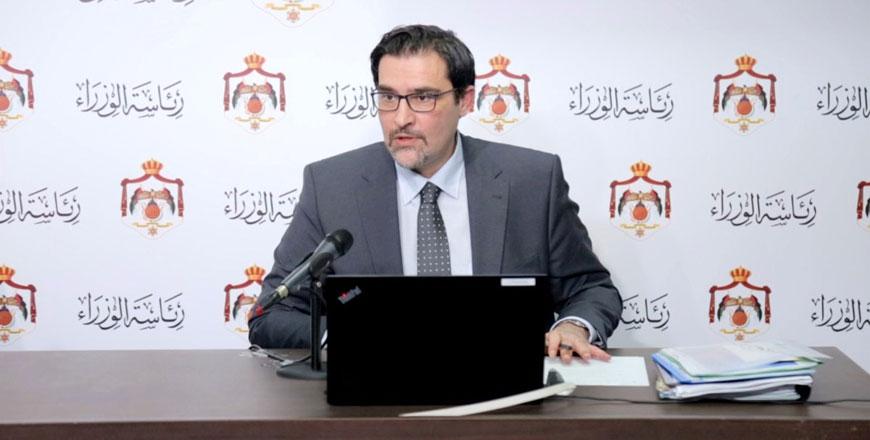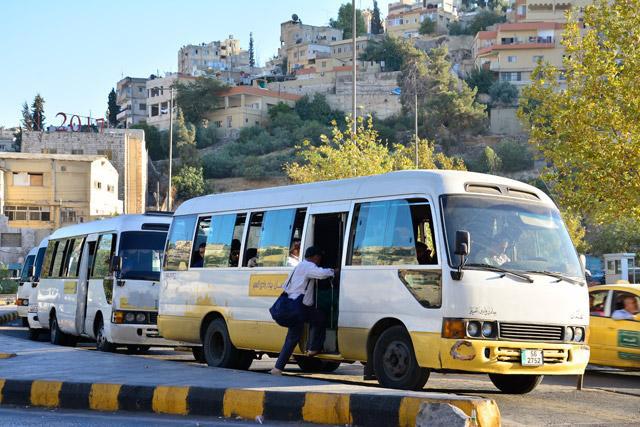You are here
TRC deploys teams to monitor adherence to COVID protocol on public transport
By Maram Kayed - Nov 23,2020 - Last updated at Nov 23,2020

The Land Transport Regulatory Commission has deployed teams in the four governorates with the aim of ‘ensuring that the various modes of public transport are complying with the safety procedures set by the government’ (JT file photo)
AMMAN — As citizens raise complaints about the lack of adherence to safety measures in public transport, the Land Transport Regulatory Commission has announced that it has deployed inspection teams in Amman, Zarqa, Irbid and Mafraq, in “the first stage of a campaign of tightened measures”.
The general director of the commission, Salah Louzi, said in a statement that the authority has deployed teams in the four governorates with the aim of “ensuring that the various modes of public transport are complying with the safety procedures set by the government”.
Manal Samer, a citizen who commutes daily from Zarqa to Amman by both bus and service taxi, said that the adherence to public safety measures is “almost non-existent”.
Samer told The Jordan Times that, while most bus conductors and passengers wear a mask before entering, there is “a large proportion of people who take their masks off once they enter the bus, and some conductors do not ask passengers to wear them in the first place”.
Moreover, Samer added that buses usually “do not adhere to the 50 per cent capacity rule or only do so if they know that there is a police patrol on their way, otherwise ignoring physical distancing requirements”.
Commission director Louzi said during an inspection tour in Sweileh, Amman, on Sunday that the authority is “working alongside the Public Security Directorate to implement the directives of Prime Minister Bisher Al Khasawneh to limit the spread of the coronavirus in various modes of public transport”.
He added that “implementing the rule of law and issuing fines for violations, both for transport operators and passengers, will definitely influence their behaviour and contribute to increased public adherence to health measures”.
“The adherence to safety measures is much greater in buses than in taxis, service taxis and public transport cars. The culture here is a big obstacle, as it is considered rude for a man to sit in the back seat of these cars, behind the plastic barrier,” said Abdel Fattah Fatimi, an Irbid resident.
Fatimi said that he had received “several rude comments and looks from drivers for choosing to wear a mask or sit behind the plastic barrier, a move which he said was perceived by some as ‘classist despite being the only approved method of riding in these cars’.”
Louzi said that these inspection tours come after the government assigned the authority as one of the bodies that are tasked with implementing defense orders.
He also added that the health protocol, issued by the National Epidemiological Committee, mandates the wearing of masks and gloves, the maintaining of physical distancing and the sterilisation of the means of public transport, in addition to the commitment of the operators to keep a seat sheet and set up a barrier between the driver and the passenger.
Louzi noted that more than 60 safety violations were recorded on Sunday among public transport vehicles, in addition to the some 2,400 violations that the authority has recorded since the beginning of the pandemic for the same reason.
Related Articles
AMMAN — Following demands from the transport sector workers to increase passenger capacities, Minister of Transport Khaled Saif announced on
AMMAN — Land Transport Regulatory Commission (LTRC) Director General Salah Louzi highlighted the need for university transport companies to
AMMAN — Operational capacity may drop to 50 per cent if the public transport sector does not adhere to coronavirus public health and safety


















